Today we are going to talk about the amplifiers used by the most iconic guitarists who ever lived!
Amplifiers play a big role in defining a sound. But how the amplifiers are used is also important. For example, two different artists might use two different gain and volume settings. Some artists rely heavily on effects where some use none. There are artists who used to overload their amplifiers to the point of melting the circuits (think Van Halen).
This article is not going to explain these variations for every artist, we'll save that for future writings. I just want to show you which amplifiers were used by these artists. Based on this information you should notice some common trends. Mainly, that certain models seem to be especially popular for particular genres.
Also, note that not all musicians are “monogamous” to one model or brand. It might change based on the era or album. For example, it is known that Billy Gibbons of ZZ Top is used both Marshall Super Leads and Fender Tweeds in the early eras but relied heavily on a Legend Brand 50 Watt on the 80s Eliminator Album. In addition, many guitarists will use one model of amp in live settings and a different one in the studio.
Given all this potential for variation, this list was made to simplify things as much as possible. I’ve listed out the amps these artists are most commonly associated with. This list should shed some light on how these guys achieved their famous sound, since amplifiers play such a large role in defining tone.
(The artists listed do not necessarily endorse the respective equipment listed.)
Fender
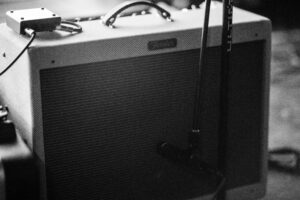
Fenders are American Amplifiers generally known for exceptional clean tones
But many models of Fenders like the tweeds provide a smooth grit when the gain and volume are cranked up. A very natural distortion results when these amps are overdriven like this. This results in a great classic sound for rocking out in a pleasing way. But when these models are played at regular gain levels, a very full and organic clean sound is produced.
But some Fender amps almost always sound clean. For example, the Twin Reverb tends to stay clean even at high gains. Usually, if you want distortion through a Fender Twin, it is best to use an effects pedal, like distortion or fuzz. For other Fenders, however, just crank up the volume/gain for a classic Fender Distortion.
In general, Fenders are best known as a pretty clean sounding amp. Lets see who used them:
Artist: The Allman Brothers' Duane Allman
Amplifier: Fender Deluxe Reverb, Fender Bassman
Artist: BB King
Amplifier: Fender Twin Reverb
Artist: The Black Crowes' Rick Robinson
Amplifier: Fender Deluxe
Artist: Buddy Guy
Amplifier: Fender Bassman
Artist: Chuck Berry
Amplifier: Fender Bassman, Fender Twin Reverb
Artist: Creedence Clearwater Revival's John Fogerty
Amplifier: Fender Bassman
Artist: Dick Dale
Amplifier: Fender Dual Showman, Fender Spring Reverb
Artist: Dire Straits' Mark Knopfler
Amplifier: Fender Deluxe
Artist: George Benson
Amplifier: Fender Twin Reverb
Artist: James Brown's, Jimmy Nolan
Amplifier: Fender Twin Reverb
Artist: Neil Young
Amplifier: Fender Deluxe
Artist: Nirvana's Kurt Kobain
Amplifier: Fender Twin Reverb, Fender Bassman
Artist: Queens of The Stone Age's Josh Home
Amplifier:Fender Bassman
Artist: Pearl Jam's Mike Mcready
Amplifier: Fender Bassman
Artist: Stevie Ray Vaughn
Amplifier:Fender Vibroverb, Fender Bassman
Artist: The Rolling Stones' Keith Richards
Amplifier: Fender Twin Reverb, Fender Bassman
Artist: The Stray Cats' Brian Setzer
Amplifier: Fender Bassman
Artist: Tom Petty and The Heartbreakers' Mike Campbell
Amplifier: Fender Deluxe
Artist: Wes Montgomery
Amplifier: Fender Twin Reverb
Artist: The White Stripes' Jack White
Amplifier: Fender Twin Reverb
Artist: ZZ Top's Billy Gibbons
Amplifier: Fender Deluxe
Marshall
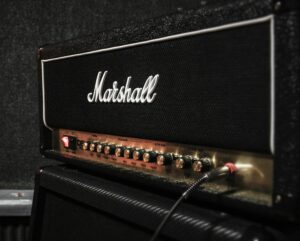
Marshalls are British made amplifiers best known for their crunchy distortion and very high volumes. Arguably the most used for hard rock and metal guitarists. British amps typically are known for a strong mid range, meaning they have a “barky” sound that stands out in a full band mix. Even when competing with loud drums, bass, and other guitars, a Marshall does a great job of cutting through and being heard.
The clean sounds, while respectable, are not known as being quite as “pretty” as Fender. Although many enjoy Marshall’s clean sound as well. Marshall’s reputation is mostly in its high volume rocking crunch. Lets see some famous Marshall lovers:
Artist: AC/DC's Angus Young
Amplifier: Marshall 1959 Superlead
Artist: Allmän Brothers' Duane Allman
Amplifier: Marshall Bass 50 Watt
Artist: Cream's Eric Clapton
Amplifier: Marshall 1959 Super Lead Plexi
Artist: Fugazi's Ian Machaye
Amplifier: Marshall JCM800
Artist: Guns N Roses' Slash
Amplifier: Marshall JCM800
Artist: Jimi Hendrix
Amplifier: Marshall 1959 Super Lead Plexi
Artist: Led Zeppelin's Jimmy Page
Amplifier: Marshall 1959 Superlead
Artist: Metallica's James Hetfield
Amplifier: Marshall JCM800, Marshall Jmp Superlead
Artist: Metallica's Kirk Hammett
Amplifier: Marshall JCM800, Marshall Jmp Superlead
Artist: Motley Crue's Mick Mars
Amplifier: Marshall JCM800
Artist: Ozzy Osbourne’s Guitarist, Randy Rhodes
Amplifier: Marshall 1959 Superlead
Artist: Ozzy Osbourne's Guitarist, Zack Wylde
Amplifier: Marshall JCM800
Artist: Pearl Jam's Mike Mcready
Amplifier: Marshall JCM800
Artist: Rage Against the Machine's Tom Morello
Amplifier:Marshall JCM800
Artist: The Ramones' Johnny Ramone
Amplifier: Marshall 1959 Superlead
Artist: The Red Hot Chili Peppers' John Fruscianti
Amplifier: Marshall Silver Jubile, JMP, JCM800
Artist: Rush's Alex Lifeson
Amplifier: Marshall Super Lead, Marshall Club and Country
Artist: Sublime's Bradley Nowell
Amplifier: Marshall JCM800
Artist: Slayer's Kerry King
Amplifier: Marshall JCM800
Artist: Slayer's Jeff Hanneman
Amplifier: Marshall JCM800
Artist: Van Halen's Eddie Van Halen
Amplifier: Marshall 1959 Super Lead Plexi
Artist: The Who's Pete Townsend
Amplifier: Marshall 1959 Superlead
Artist: Yngwie Malmsteen
Amplifier: Marshall JMP MK II
Artist: ZZ Top's Billy Gibbons
Amplifier: Marshall 1959 Superlead
Vox
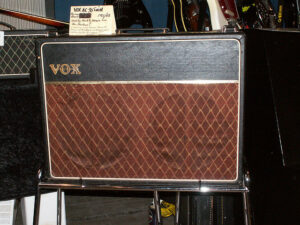
Photo by jonsson / cc by 2.0
Vox Amplifiers are British made, and known for their distinctive sound best described as crisp, punchy, chimey and sparkly (think of the intro to the Beatles “Eight Days a Week. “) Vox Amps are known for clean sounds, but in particular, a distinctive British clean sound which emphasizes upper-midrange frequencies. Just like in smaller Fender Combo Amps, they distort slightly when overdriven. But Vox Overdrive is also distinct from Fender Overdrive due to the frequency range that the Vox emphasizes. At a distorted level there is a distinct characteristic I can only describe as “boxey”. Think of Brian Mays solo on "We Will Rock You." Lets look at some artists that have been known to use Vox Amps:
Artist: The Beatles' John Lennon
Amplifier: Vox AC 30
Artist: The Beatles' George Harrison
Amplifier: Vox AC 30
Artist: Brad Paisley
Amplifier: Vox AC 30
Artist: Led Zeppelin's Jimmy Page
Amplifier: Vox AC 30, Vox UL4130
Artist: Nirvana's Kurt Kobain
Amplifier: Vox AC 30
Artist: Queen's Brian May
Amplifier: Vox AC 30
Artist: The Rolling Stones' Keith Richards
Amplifier: Vox AC 30
Artist: Tom Petty
Amplifier: Vox AC 30
Artist: U2's The Edge
Amplifier:Vox AC 30
Mesa Boogie
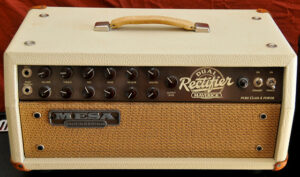
Photo by Artbrom / cc by-SA 2.0
Mesa Boogies are American made and popular with a lot of metal guys, as an American-Made alternative to Marshall. They have a crunch at high gains but it is a more “American” style crunch with less midrange. As compared to Marshall they are said to have a quicker, harsher attack response. Like other American made amplifiers, namely the Fenders, the Mesa Boogies are also known for clean sounds, which are especially pretty.
It is almost like a "best of both worlds" scenario with the Mesa Boogies, as their strengths lie in both clean, and distorted sounds. The only possible downside is that they have a reputation of being touchy, and somewhat of a challenge to dial in. Once dialed in they are said to be pure nirvana for many players! Lets see who some of these guys are:
Artist: Carlos Santana
Amplifier: Mesa Boogie Mark I
Artist: The Foo Fighters' Dave Grohl
Amplifier: Dual Rectifier
Artist: Korn's Brian Welch
Amplifier: Dual Rectifier
Artist: Living Colour's Vernon Reid
Amplifier: Dual Rectifier
Artist: Metallica's James Hetfield
Amplifier: Mesa Boogie Mark IIC+
Artist: Metallica's Kirk Hammett
Amplifier: Mesa Boogie Mark IIC+
Artist: Nirvana's Kurt Kobain
Amplifier: Mesa Boogie Mark III
Artist: Prince
Amplifier: Mesa Boogie Mark IIC+
Artist: Soundgarden
Amplifier: Dual Rectifier
Artist: Tool's Adam Jones
Amplifier: Dual Rectifier
Artist: The Rolling Stones' Keith Richards
Amplifier: Mesa Boogie Mark I
Laney
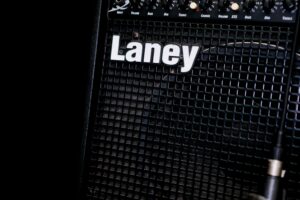
Laneys are British made guitar amplifiers. Like Marshall, Laney is also known for British midrange, crunch, and incredibly high volume potential although the sound is distinct from a Marshall. Having owned a 100 Watt Laney AOR halfstack myself, I can only describe them as being less bright and a little warmer in their distortion. They seem a bit slower on the attack, and less tight in the crunch. But they are equal in balsyness and like the Marshall, they cut through the band mix quite well. In fact, their strength lies in a band mix, where they seem to give a special "thickness" to the overall sound.
This would describe why they are perfect for that gloomy Black Sabbath sound, and for all the “Stoner Metal” bands that used them in the 90s. You might consider them a British alternative to Marshall for metal. They have similarities to Marshall but definitely sound and respond differently. Some Marshall enthusiasts covet the Laney sound so much that they have been known to "Hot Rod" their Marshall to give it a Laney color. The first thing many compare a Laney to when they hear it, is a "Hot Rodded Marshall" Sound.
They are especially popular in Doom / Stoner Metal. A couple of past artists that are known for Laneys include:
Artist: Black Sabbath's Toni Iommi
Amplifier: Laney LA 100
Artist: Paul Gilbert
Amplifier: Laney GH 100L
Peavy
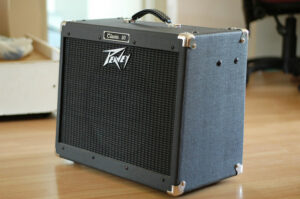
Photo by Jc / cc by 2.0
Peavies are American made amps known mainly for high gain metal sounds but respectable cleans as well. Peavy is a competitor to Marshall but with a more “American” high-gain sound. Peavy's 5150, endorsed by Eddie Van Halen, was able to produce American as well as British distortion very well. Peavy is also well known for producing solid-state amps that sound just like tube amps.
Artist: Alice in Chains' Jerry Cantrell
Amplifier: Peavy 5150
Artist: Joe Satriani
Amplifier: Peavy JSX
Artist: Ted Nugent
Amplifier: Peavy 6505
Artist: Van Halen's Eddie Van Halen
Amplifier: Peavy 5150
Roland
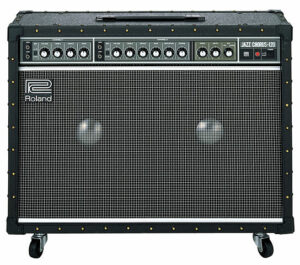
Photo by Musikvertrieb Deutchland / cc by 2.0
Rolands are Japanese amplifiers. Amps like the Roland JC-120 are often called the "kings of clean." They are famous for being crisp and clean at any level. Here are some notorious users of the Roland JC-120:
Artist: The Cure's Robert Smith
Amplifier: Roland JC-120
Artist: The Police's Andy Summers
Amplifier: Roland JC-120
Artist: The Smiths' Johnny Marr
Amplifier: Roland JC-120
Artist: Steely Dan / Doobie Brothers'Jeff “Skunk” Baxter
Amplifier: Roland JC-120
Artist: Sublime's Bradley Nowell
Amplifier: Roland JC-120
Randall
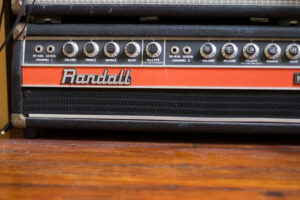
Photo by David Hilowitz / CC by 2.0
Randalls are American made amps known for their American sounding crunch with a couple of scoops taken out of the midrange. They are also known for building solid-state amps that sound just like tube amps.
Artist: Def Leppard's Phil Collen
Amplifier: RG 80 (For Live Gigs)
Artist: Pantera's Dimebag Darrel
Amplifier: Randall RG 100H, Randall Century 200
Hiwatt
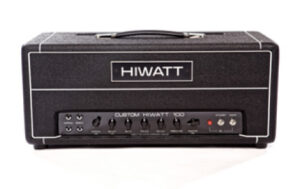
Photo by Oneparadigm / CC BY-SA 4.0
Hiwatts are British made amps known to be very clean even at high volumes. Their sound had been said to be somewhere midway between a Vox and a Fender, as far as tone is concerned.
Artist: Led Zeppelin's Jimmy Page
Amplifier: Hiwatt Custom
Artist: Pink Floyd's David Gilmore
Amplifier: Hiwatt DR103
Lab Series
These American made amps are said to have a sound very similar to that of vintage Fenders.
Artist: BB King
Amplifier: Lab Series L5
Artist: Joe Bonnamassa
Amplifier: Lab Series L5
Magnatone
These classic American made amps are known for a very rich and clean tone.
Artist: Buddy Holly
Amplifier: Magnatone 280
Soldano
These American made amplifiers are commonly known for versatility, doing a great job on gritty Marshall type tones as well as clean blues tones.
Artist: Motley Crue's Mick Mars
Amplifier: Soldano SLO-100
Artist: Prince
Amplifier: Soldano SLO-100
Hope you enjoyed this article. If you feel that I have left off any key amplifiers for any particular artist please let me know in the comments below. And keep in mind that a lot of the amplifiers that artists endorse are not necessarily the ones they actually use. With that said I am open to your comments. Let’s make this list as useful as possible!
Sign up Below To Be A Part of The Connoisseur Community!
Don't worry, I am a minimalist and will only send occasional Emails when I have something important or very valuable to share. And it is a good idea to stay connected to valuable sources! Sign Up Below !!
[sibwp_form id=2]
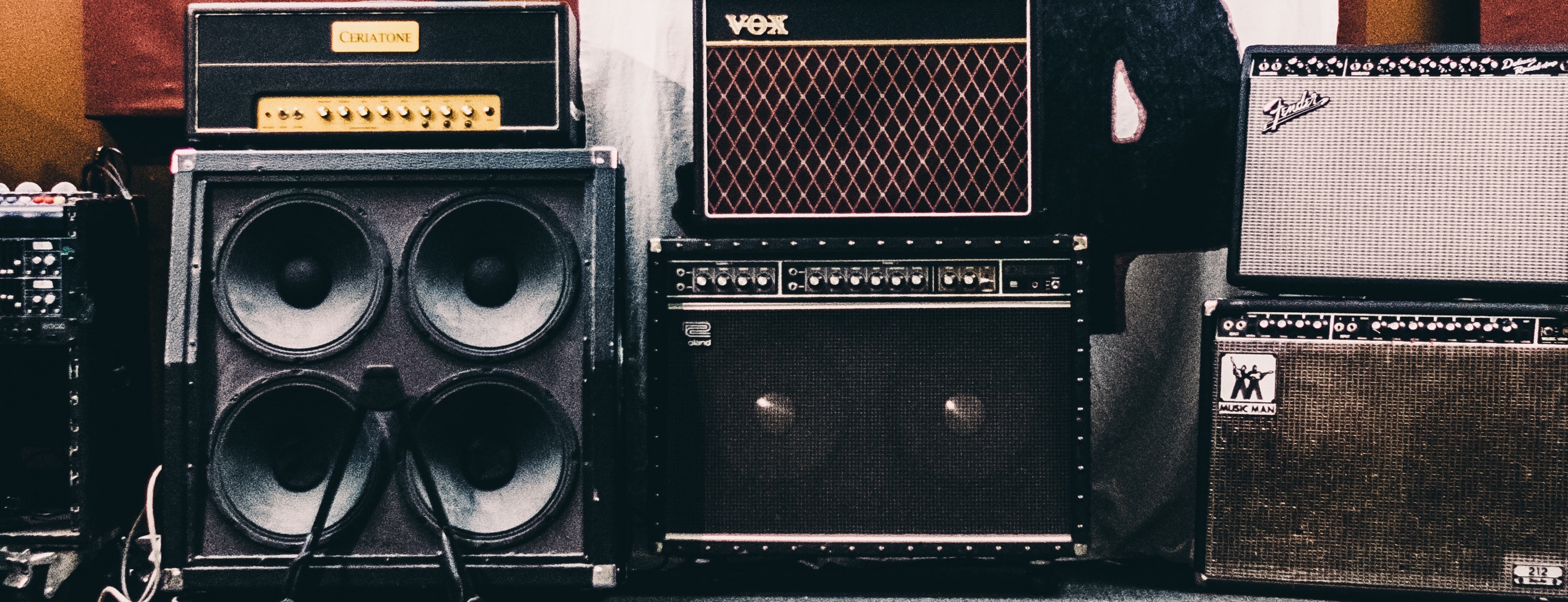
Really informative blog post. Really looking forward to read more. Lillis Henri Seraphim
whoah this blog is great i love reading your articles. Keep up the great work! You know, lots of people are looking around for this info, you can aid them greatly. Marice Sylvester Jada
I was curious if you ever thought of changing the layout of your blog? Its very well written; I love what youve got to say. But maybe you could a little more in the way of content so people could connect with it better. Youve got an awful lot of text for only having 1 or 2 pictures. Maybe you could space it out better?| Eloise Devland Daley
Your style is so unique in comparison to other people I have read stuff from. I appreciate you for posting when you have the opportunity, Guess I will just bookmark this page.